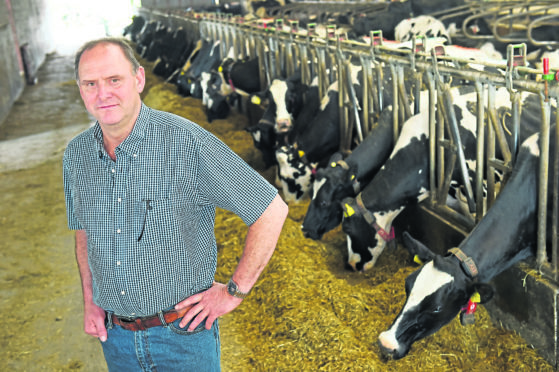Furious farmers have demanded a rethink after learning they will be banned from using the AWPR.
Union chiefs have called for a meeting with Transport Scotland as they attempt to persuade them to reverse a decision to ban agricultural vehicles from the £750million bypass.
Farming vehicles can use dual carriageways but are barred from motorways, and it is understood roads bosses will apply the latter standards to the new route.
The decision has sparked anger in the wake of years of disruption, with many farmers forced to give up large sections of their land while construction work was carried out.
Concerns have also been raised about the practicalities of moving livestock from the Ellon area to the slaughterhouse at Portlethen – while others have pointed out the prohibition would force farmers to take vehicles through the city, driving up pollution.
Now the National Farmers’ Union Scotland (NFUS) is calling for a meeting with Transport Scotland in an attempt to overturn their decision.
Lorna Paterson, the union’s north-east regional manager, said last night that it was “ridiculous” farmers would be excluded from the road given they had born the brunt of the disruption the huge construction project had caused.
She said: “The fact is farmers have been the biggest victims of the road, they have had a huge amount of hassle the whole way along and while we are all very grateful it’s going to be in place, to turn round and tell them they won’t be able to use it is ridiculous.
“It’s also not good for carbon emissions either, farmers are constantly being told they have to cut down and there’s the 90% reduction target. In that same vein how is it more efficient to ask farmers to use other roads rather than use this fast link?”
The NFUS discussed the issue at the New Deer Show but now wants a formal meeting with transport chiefs to resolve the situation.
It is understood that Transport Scotland has assigned the route a “special designation” which allows tractors to be prohibited.
North East MSP Peter Chapman, who is also a farmer, said: “Farmers are up in arms about this.
“From the correspondence I have seen, it would appear the AWPR will be given special road designation, meaning tractors won’t be allowed.
“My view is that this road is not a motorway, it is a dual carriageway and therefore tractors should be permitted to travel along the route.”
David Winton, a farmer at Haugh of Birse, near Aboyne, and regional manager for the NFUS, said the decision would cause unrest in the community.
He said: “We have just recently found out about this and really need a meeting with Transport Scotland to find out what has happened.
“At the moment there’s nothing about this on the signage and there’s nothing about this ban on them. It’s a dual carriageway not a motorway so tractors shouldn’t be banned.
“If they are now going to be banned then you’re going to have to do the same from Friarton Bridge (near Perth) to Ellon.”
Another farmer questioned the need for a ban when it was likely there would be very few opportunities for vehicles to turn right into oncoming traffic – a common cause of accidents on other roads like the A90.
Turriff councillor Iain Taylor said one of the biggest concerns in the farming community was how they would transport livestock from Ellon to the slaughterhouse at Portlethen.
And dairy farmer Roddy Catto, of Hillhead of Muirton at Whitecairns, said he could not understand how the decision could be justified.
He said: “If they are going to put a ban in there then they are going to have to ban traffic from Ellon to Dundee as well.”
A Transport Scotland spokesman said: “The AWPR/B-T is neither a Motorway or Dual Carriageway, it is designated as a Special Road. As such, agricultural vehicles need to meet specific conditions to travel on the road. The consequences of a Special Road designation were considered at a Public Local Inquiry in 2008.
“The road has been progressed on the basis of the Orders presented at the PLI. One of these conditions prevents agricultural vehicles from traveling more than 1.5km between farm land, unless they are being used for horticultural purposes such as trimming verges.
“We understand that this means that it is not possible to meet this distance criterion on the new road. However, as strategic traffic will transfer from the existing road network to the AWPR, we expect to see significant journey time savings on local roads, generating significant benefits for agricultural use.”
A Transport Scotland spokesman said: “The AWPR/B-T is neither a Motorway or Dual Carriageway, it is designated as a Special Road. As such, agricultural vehicles need to meet specific conditions to travel on the road. The consequences of a Special Road designation were considered at a Public Local Inquiry in 2008.
“The road has been progressed on the basis of the Orders presented at the PLI. One of these conditions prevents agricultural vehicles from traveling more than 1.5km between farm land, unless they are being used for horticultural purposes such as trimming verges.
“We understand that this means that it is not possible to meet this distance criterion on the new road. However, as strategic traffic will transfer from the existing road network to the AWPR, we expect to see significant journey time savings on local roads, generating significant benefits for agricultural use.”

